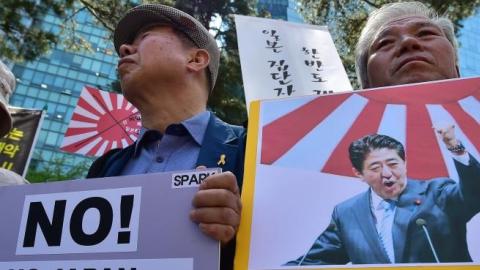When Prime Minister Shinzo Abe becomes the first Japanese leader to address a joint session of the US Congress tomorrow evening in Washington, his objective will be convincing Americans of the need for a more proactive and can-do Japan in Asia.
This is no easy feat in a year marking the 70th anniversary of the defeat of imperial Japan to end World War II, and Mr Abe will want to offer remorse for the past but also focus on Japan's enormous contribution to the rebuilding of East Asia after the war.
As he told a joint sitting of Australia's Parliament last July, his country's 70 years of being a model international citizen proves that it is a changed land and it is time to "give Japan a go".
The message of not allowing the past to prevent the addressing of future challenges is a message enthusiastically received by most states in South-east Asia.
But not so in North-east Asia, where neighbours China and South Korea still suffer from a troubled relationship with Japan.
While Asia is filled with longstanding rivalries, revelations that Seoul has engaged Washington-based BGR Public Relations to undermine Mr Abe prior to his address - by promoting Seoul's interpretation of wartime history and allegations of inadequate Japanese remorse - will not be well-received by many Americans.
Nor will it go down well with South-east Asians, who generally abhor the airing of local dirty laundry on foreign soil.
This means that while Mr Abe must still deliver the right messages with sincerity to achieve his objectives, Seoul may have done its standing in the United States and the region - not to mention its interests - a disservice.
Why the renewed interest in Japan? Despite its two decades of economic stagnation, it remains Asia's second-largest and most innovative economy. And there are signs that the so-called "Abenomics" might just jump-start the huge but moribund economy.
Although known as primarily an economic power and still restricted by a Constitution imposing considerable restraints on Japan engaging in military activities far from its shores, its navy and air force are still considered the most advanced and well-oiled in the region after America's.
In addition to his Congress speech, Mr Abe is in Washington to put the finishing touches to the critical revision of the US-Japan Defence Guidelines, not altered since 1997. For South-east Asians, there is much at stake. If the security system that was forged after the end of World War II is to survive and adapt to meeting contemporary challenges - not least to collectively deter a nuclear-armed North Korea and persuade China to play by the rules - then the most capable allies, like Japan, will need to accept a larger strategic and security role.
Much of the region is watching to see whether US allies will step up to the plate. And it seems Mr Abe is trying to do just that.
In South-east Asia, even countries that suffered under the yoke of Japanese imperialism have taken a more strategic view of their interests in mending relations with Tokyo. In contrast, ties between Japan and South Korea have worsened over the past decade, even as North-east Asian problems that necessitate a more proactive Japan have deepened.
Washington and the South- east Asian governments know that there is a long way to go before these two countries can bury the hatchet. But no one will support using history as a weapon to intentionally damage the other for domestic political gain.




















